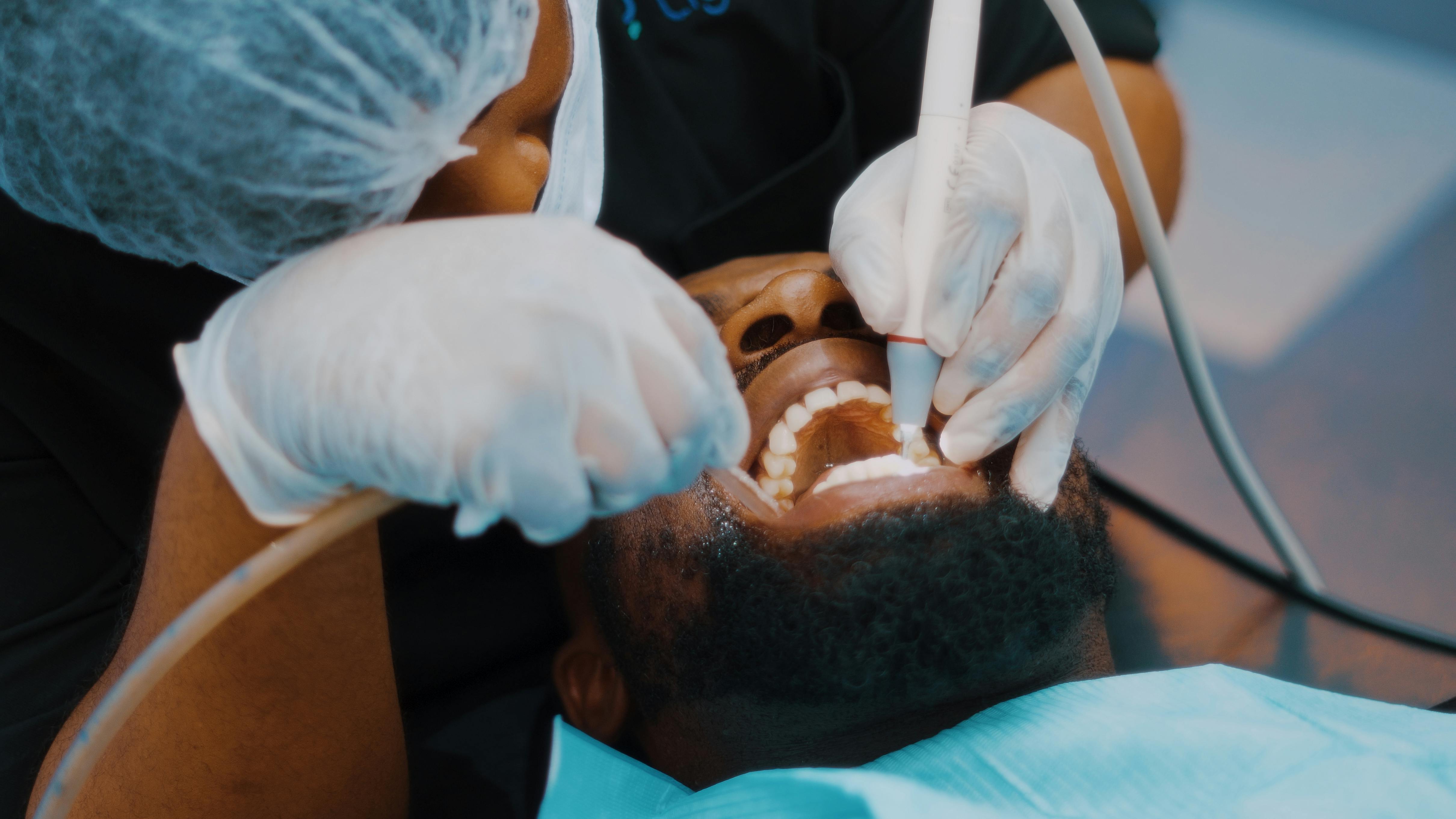Can dentists fill in chipped teeth? Yes, they can! Dentists have a variety of treatments and procedures available to repair chipped teeth. Depending on the size and location of the chip, the dentist may recommend one or more of the following treatments: bonding, veneers, crowns, or inlays/onlays. The dentist will also assess the health of the tooth to determine if a root canal or other treatments are necessary before repairing the chip. With any of these treatments, your dentist can help restore your smile and improve your overall oral health.Chipped teeth refer to a dental condition in which the tooth enamel has been cracked or broken off, leaving an uneven surface. This can occur due to trauma, grinding of the teeth, or biting hard objects. Chipped teeth can range in severity from minor chips at the edges of the teeth to large cracks that may extend deep into the tooth. Treatment for chipped teeth depends on the extent of damage and may include bonding, crowns, or veneers.
Can Dentists Repair Chipped Teeth?
Yes, dentists are able to repair chipped teeth. Depending on the extent of the chip, a dentist may use one of several different treatments to repair the tooth. For small chips, a dentist may be able to file down and smooth out the surface of the tooth, restoring its normal shape and appearance. For larger chips, a dentist may need to use bonding material or even fillings to rebuild the tooth. In some cases, a crown may be needed in order to fully restore the shape and strength of a chipped tooth.
If a chip is deep enough that it reaches the inner layers of the tooth, it can cause sensitivity and pain when eating or drinking hot or cold foods. In this case, it’s important to see a dentist right away in order to prevent any further damage or infection. A dentist will be able to assess the damage and provide you with options for repairing it.
It’s important to take care of chipped teeth as soon as possible. While most chips can be repaired relatively easily, if left untreated they can lead to more serious problems such as infection and decay. By seeing a dentist promptly after noticing a chip in your tooth you can prevent further damage and ensure that your smile remains healthy and strong.
Filling in Chipped Teeth
Dentists have several options for repairing chipped teeth. Depending on the extent of the damage, dentists may use bonding, veneers, crowns, or a combination of these treatments. Bonding is a procedure in which a tooth-colored resin material is applied and hardened with a special light, and then shaped and polished for a natural appearance. Veneers are thin shells of porcelain that are custom-made to fit over the front surface of a tooth and can be used to correct chips and other imperfections. Crowns are caps that fully cover the existing tooth structure to restore its original shape and function. In some cases, dentists may also use orthodontic treatment to reposition teeth that have been chipped or fractured.
No matter what treatment option is chosen, it is important to get chipped teeth treated as soon as possible to avoid further damage or decay. Dentists can help identify the best solution for each individual patient depending on their specific needs and desired outcome. With proper care and regular dental visits, patients can enjoy beautiful smiles that last for years to come.
Pros of Filling In Chipped Teeth
Filling in chipped teeth can be an effective and easy way to improve the appearance of your smile. It can also help to reduce the risk of future dental problems as it can help protect the exposed root from damage and decay. Filling in chipped teeth can also help to improve the overall health of your teeth by strengthening them and preventing further chipping or cracking. Additionally, filling in chipped teeth can help to restore a person’s confidence in their smile since they no longer have to worry about having a visible chip.
Cons of Filling In Chipped Teeth
The main downside to filling in chipped teeth is that it requires a dental procedure which may be costly or uncomfortable for some people. Additionally, depending on the extent of the damage, more than one procedure may be necessary which will increase cost and discomfort. Additionally, there is always a risk that the filling could become dislodged or damaged due to wear and tear, meaning that you would need to replace it periodically. Finally, some people may not like the look of their filled tooth as compared to their natural tooth as it can appear unnatural or even plastic-like.
Filling in Chipped Teeth
The cost of filling in chipped teeth can vary greatly depending on the extent of the damage and the type of repair needed. Treatment may involve bonding, veneers, crowns or implants, all of which have different costs associated with them. In general, minor chips can be fixed with bonding for around $100 to $400 per tooth. The cost for veneers may be anywhere from $500 to $1,500 per tooth and crowns may cost between $800 and $2,000 per tooth. Implants may be the most expensive option, costing up to $4,000 per tooth.
The best way to determine how much it will cost to fill in chipped teeth is to speak with a dentist who can assess the damage and recommend a course of treatment. They can provide an estimate for the cost of each treatment option and help you choose the one that best fits your budget and needs.

Types of Materials Used To Fill In Chipped Teeth
The type of material used to fill in a chipped tooth depends on the severity of the damage. For minor chips, composite resin bonding is often used. This is a composite material made up of plastic and glass particles that can be matched to the color of the existing tooth. The material is applied directly to the affected area and cured with a special light. Composite resin bonding is strong, durable and aesthetically pleasing.
For more severe cases, a porcelain dental veneer or crown may be necessary. A dental veneer is a thin layer of porcelain that is bonded to the front surface of the tooth in order to restore its shape and appearance. A crown, on the other hand, completely covers the entire visible portion of the damaged tooth and protects it from further damage. Both options are very effective in restoring chipped teeth and are usually made from high-grade dental porcelain for optimal strength and durability.
In addition to these options, dentists may also use gold or silver amalgam fillings to repair chipped teeth. These types of fillings are made up of metal alloys that are combined with mercury for added strength and durability. They are less aesthetically pleasing than composite resin bonding or porcelain veneers/crowns, but they do provide long-term protection from further damage due to their superior strength and durability.
No matter what type of material is used to fill in a chipped tooth, it’s important that you visit your dentist for regular checkups so they can monitor any changes in your chipped teeth over time.
How Long Will It Take To Fill In A Chipped Tooth?
When it comes to filling in a chipped tooth, the amount of time it takes will depend on the severity of the chip. For minor chips, a dental filling can be used to repair the tooth and may only take one visit to the dentist. However, for more severe chips, more extensive treatments may be required. This could include a dental crown, veneers, or bonding. Depending on the type of treatment chosen, this process can take anywhere from one to several visits to the dentist.
If you are considering having your chipped tooth repaired, it is best to consult with your dentist first in order to determine what type of treatment will be necessary and how long it will take for the procedure. They will be able to evaluate your tooth and provide an estimate of how long it will take to complete the repair process.
In most cases, if you choose a dental filling as treatment for your chipped tooth, you can expect the entire process to take less than an hour. Your dentist will prepare your tooth and then fill it with a composite material that matches the color of your existing teeth. After that is completed they will polish and shape the filling to ensure a comfortable fit in your mouth.
For more extensive treatments such as veneers or crowns, multiple visits may be required in order for your dentist to properly prepare and finish the restoration process. During these visits they may need to remove decay from around the affected area before fitting custom made crowns or veneers that match your existing teeth’s shape and color. This process can take anywhere from two weeks up to several months depending on how severe the damage is and what type of restoration is needed.
Overall, repairing a chipped tooth depends on several factors including severity of damage and type of treatment chosen. If you have a chipped tooth, schedule an appointment with your dentist so they can evaluate what options are available and determine how long it will take for them to fill in or repair your tooth.
Is Filling In A Chipped Tooth Painful?
Filling in a chipped tooth can be a painful experience, depending on the severity of the chip and the type of filling that’s used. If the chip is only minor, then it may not cause any pain at all. However, if the chip is deep and requires a more invasive procedure such as a root canal or crown placement, then there can be some level of discomfort during and immediately after the procedure. Local anesthesia may be used to reduce any discomfort, but it’s important to talk to your dentist about any potential pain you may experience during the procedure so that you can be prepared.
Most fillings are relatively simple procedures and should not cause too much discomfort. Generally, you will feel pressure during the procedure as your dentist works to fill in the chip and shape it to match your existing teeth. The area may also feel tender after the procedure is complete, but this should subside within a few days. Your dentist may prescribe you an over-the-counter pain reliever to help manage any residual pain or sensitivity that you may experience.
It’s important to speak with your dentist about any concerns or questions you have regarding filling in a chipped tooth before undergoing the procedure. With proper care and maintenance, a filling should last for many years without causing any additional discomfort.

Conclusion
Yes, dentists can fill in chipped teeth. Many treatments are available, such as composite fillings, crowns, and veneers. Each treatment has its own pros and cons that must be considered before making a decision. Ultimately, the best course of action for filling in a chipped tooth will depend on the size and severity of the chip.
No matter which treatment is chosen, it is important to consult with your dentist to ensure that you are receiving the best care possible. A dentist can evaluate the extent of damage and determine which treatment option is best for you. Taking proper care of your teeth can help to prevent chips or further damage from occurring in the future.
In conclusion, dentists can fill in chipped teeth with a variety of treatments such as composite fillings, crowns, and veneers. It is important to consult with a dentist who can give you an evaluation and suggest the best course of action for your individual needs. Proper dental hygiene should also be practiced to help prevent chips from occurring in the future.
